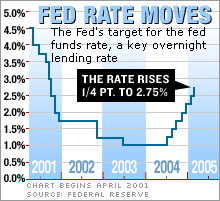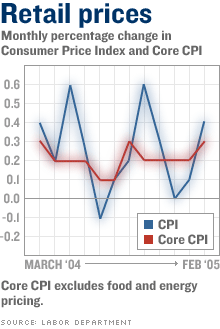 |
 |
|
|
|
|
|
|
| More about the markets and economy
|
|
|
|
|
NEW YORK (CNN/Money) – Wall Street needs some cheering up after last week. A big old hug even.
Sure, there are some things to be worried about. With oil hovering near $50 a barrel and other commodity prices much higher than last year there could be a pickup in inflation.
IBM's (Research) shocking earnings miss last week is a possible sign of weakening corporate demand for technology products and services. Retail sales for March came in much weaker-than-expected. And the trade deficit hit a record high in February -- all signs of a likely slowdown in economic growth.
But the market has also decided to ignore some good news. The Federal Reserve has hinted that aggressive interest rate hikes are unlikely in the near future. Oil prices, while still high, have come down recently. And Apple's (Research) strong earnings report indicates that many consumers are still spending.
"It seems as if we have re-entered the bizarre world in which every piece of news must be interpreted as being bad for equity investors," Tobias Levkovich, chief U.S. market strategist for Citigroup Smith Barney, wrote in a report Monday.
What makes last week's sell-off more surprising is that only a few weeks ago, investors were worried about inflation, which is typically a sign of an overheated economy -- not one that's slowing down. Now, investors fear the exact opposite scenario... a slowdown or worse.
"The market goes through these bizarre mood swings. All of a sudden, people are concerned that we're in a soft patch and that it may get worse before it gets better," said Ed Yardeni, chief investment strategist with Oak Associates, a mutual fund firm based in Akron, Ohio.
Economy does the fox-trot
So what's next for stocks? Several market pros say one thing's for certain -- expect more volatility. Simply put, conditions aren't so bad to justify another major sell-off but the outlook for the economy and earnings growth aren't rosy enough to bet on a big rally, either.
"The market is now factoring in that first-quarter earnings will likely be below consensus," said Subodh Kumar, chief market strategist with CIBC World Markets in Toronto. "And the reality is that economic growth is probably going to be between 3.5 percent and 4 percent, which is good but maybe not as strong as what some people were hoping for."
Jeffrey Saut, chief market strategist with Raymond James, described the current environment as a "fox-trot economy", meaning he expects several periods of strong economic and earnings growth to be followed by times where profits and the economy slow down a bit.
"I'm not bearish. I don't think we're going into a recession and I'm not worried about deflation" from a severe slowdown, Saut said. "But earnings growth should only be about 7 to 8 percent this year and guidance for earnings keeps coming down."
The good news is that such a scenario gives the Fed little incentive to get much more aggressive in its rate-hiking campaign.
"The Fed has worked too hard to reinvigorate the economy after a series of shocks, in our opinion, to drive everything back down," Levkovich wrote.
Saut said he expects the Fed to raise its short-term rate target another quarter-point, to 3 percent, at its next meeting on May 3. But after that, he thinks the Fed may pause to gauge the effect its rate hikes have had on the economy so far. If the Fed does raise in May, it would be its eighth increase since June 2004.
In theory, low rates should help boost the economy and corporate profits -- and thus stock prices. But even with the Fed's recent rate hikes, its federal funds rate, a short-term rate for overnight bank loans, is at 2.75 percent -- the highest since September 2001 but still well below historical norms.
"Earnings are still going to grow as interest rates and inflation remain low," Yardeni said, adding that if oil retreats further, the market will eventually treat this as positive news.
Eyes on warnings, inflation
Still, investors will likely need to see some convincing evidence that earnings growth won't deteriorate much further before being compelled to buy stocks again. The bad earnings news from IBM and profit warnings from Wal-Mart (Research) and Ford (Research) earlier this month certainly aren't reassuring.
"Major market indexes are going to remain in a range," said Saut at Raymond James. "I don't see a big trigger on the upside."
So investors may continue to seek a safe haven in the Treasury bond market, which tends to outperform stocks during periods of sluggish economic growth. To that end, bond prices surged last week as investors grew less worried about inflation, sending the yield on the 10-year U.S. Treasury from 4.49 percent to about 4.24 percent. Bond prices and yields move in opposite directions.
But the inflation watch is far from over, which could lead to more volatility in the bond market as well. Two big economic reports due this week will give more clues about what impact high energy costs may be having on prices for other goods and services.
On Tuesday, the producer price index (PPI) for March will be released. Economists expect the measure of prices at the wholesale level rose 0.6 percent with the core PPI, which excludes the cost of food and energy, up 0.2 percent.
The March consumer price index (CPI) is due out on Wednesday. Economists are forecasting a 0.5 percent increase in the headline number and a 0.2 percent increase in the core CPI.
"Bonds clearly got a boost from the flight to safety. But looming on the horizon are the consumer and producer price reports and the CPI is going to be the most important," said David Joy, capital markets strategist with American Express Financial Advisors. He added that if the core CPI is above 0.3 percent, that's likely to spark renewed fears of inflation.
But all in all, strategists said investors shouldn't panic about the recent spate of disappointing news because the outlook for the market and economy hasn't changed all that drastically.
"This is more a readjusting of expectations as opposed to a readjusting of the economy," said Kumar.
For more about the economy and the Fed, click here.
For a look at market data, click here.

|